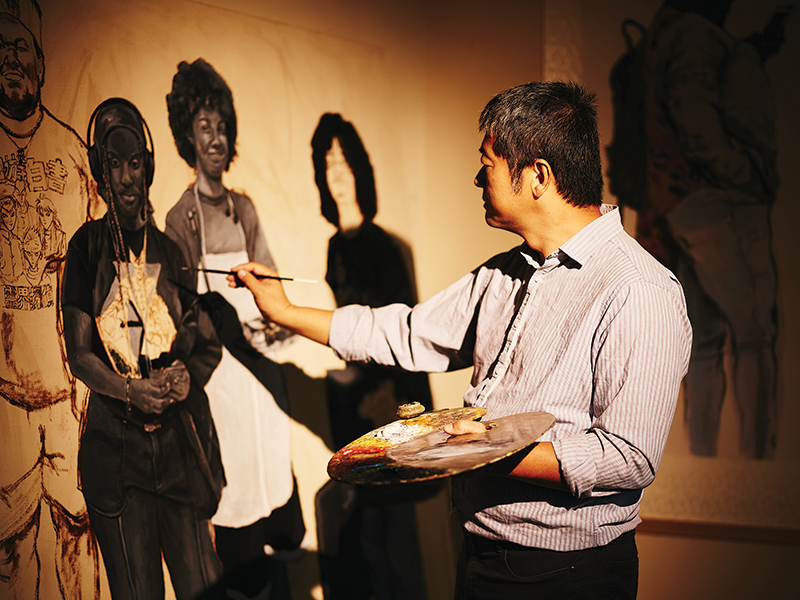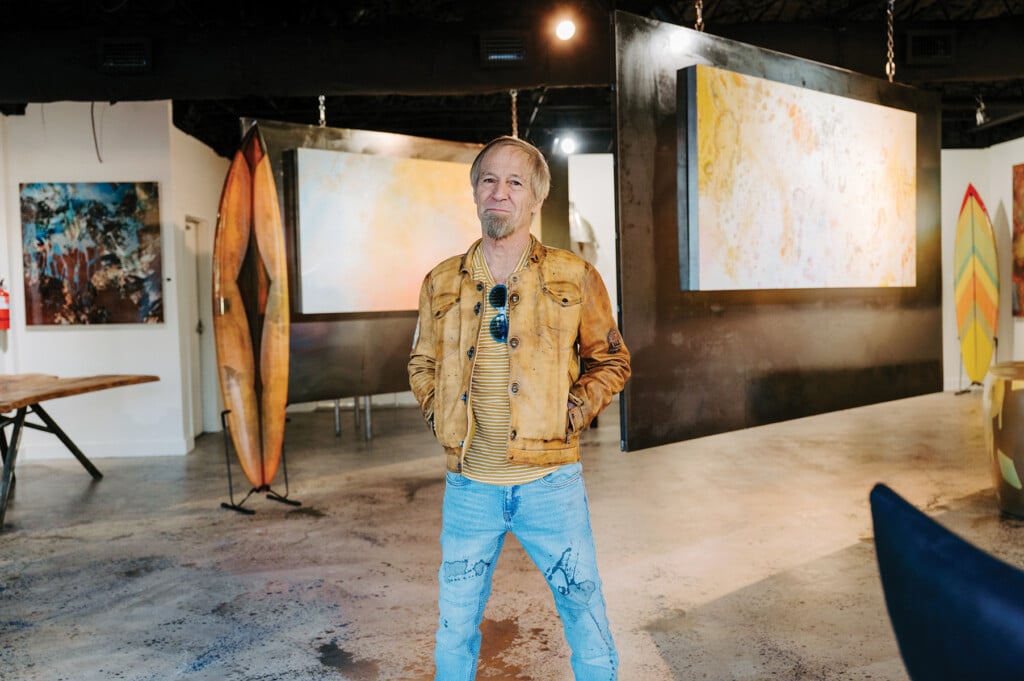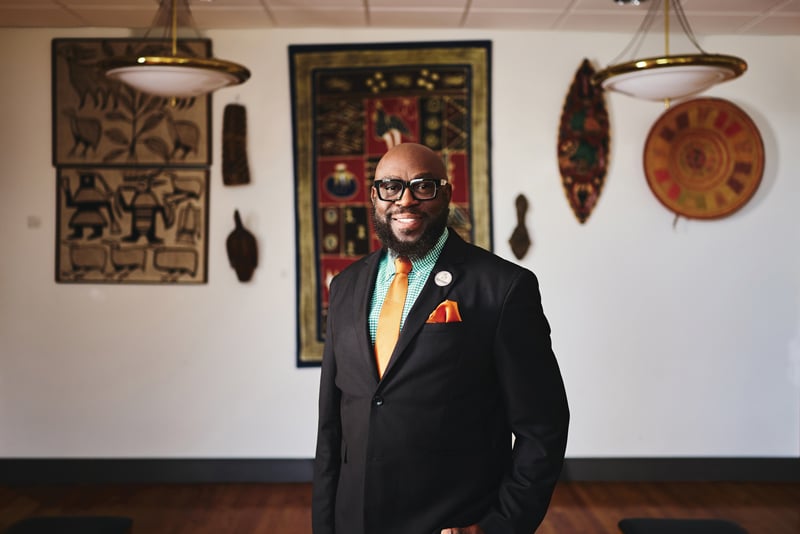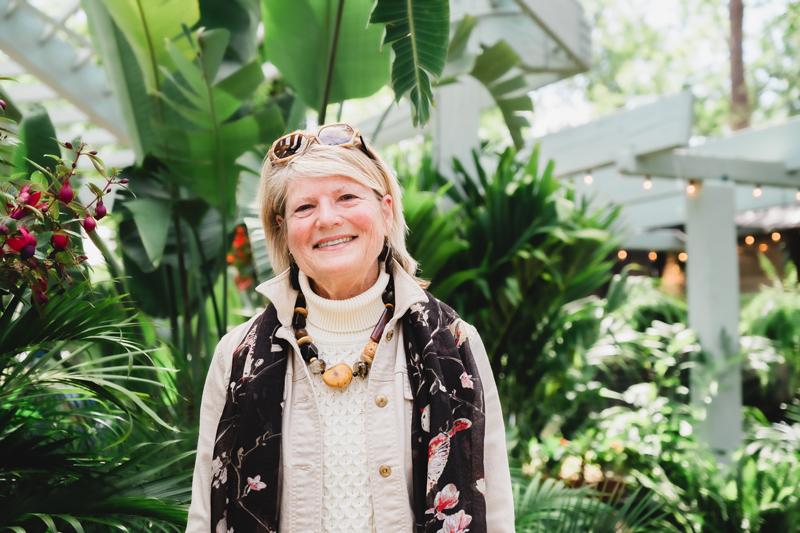Blending East and West
FAMU prof finds inspiration in his surroundings

I meet art professor Nan Liu sitting at a picnic table overlooking Lake Ella. A fountain quietly erupts across the water and a variously colored duck circles us hoping for a crumby handout.
It seems appropriate to be lakeside. Chatting about topics like the Chinese influence on Dr. Liu’s “Western” paintings, the importance of landscape painting in Eastern art, and his journey from Tianjin, China, to Tallahassee needs the expansiveness of a natural setting — much like Liu’s life arc to date.
Nan Liu, 49, speaks English fluently and at breakneck speed after spending 15 years as a professor of art in the Department of Visual Arts, Humanities & Theatre at Florida A&M University. He has pursued a career in art education since graduate school in Beijing. But his introduction to brush painting and the artistic production of detailed Chinese letters began much earlier and perhaps offered an introduction to the Western-style art that emerged in his paintings later.
Liu said Chinese brush painting, often done on paper made from bark and rice straw, was taught early to school children. The various styles of brush painting reflect the tastes of the dynasties that governed China, but landscapes, mountains and nature have always held sway.
In middle school, 12-year-old Liu was introduced to Western art and oil painting, forms that weren’t emphasized again until much later in his undergraduate career. Copying paintings made in the West in an after-school program widened his artistic vision. Despite today producing large-frame oil paintings, Liu says he didn’t truly begin experimenting with oils until he was a graduate student stretching professor’s canvases.

Plein air landscapes by Nan Liu have been made part of the annual art faculty exhibition at the Foster Tanner Fine Arts Gallery at Florida A&M University. Photo by The Workmans
Now, he said, “I think an oil painting is more powerful than a photograph.”
Liu began winning art awards even before entering Nan Kai University, where he majored in Chinese brush painting. He studied art education in Beijing, and in 1999, he came to the U.S. to earn a master’s degree at the University of Arkansas. He then moved to Tallahassee and completed master’s of fine arts and doctoral programs in art education at FSU.
Liu has enjoyed success as a hardworking professor and as a painter with 16 solo shows in museums and galleries. He has won dozens of awards and prizes, served as an artist in residence at universities and written a book for a Chinese audience on art education in the U.S. He was even interviewed by a critic with the Huffington Post.
“I love painting what I see around me,” Liu said. “Nature has inspired much of my work in recent years. I’ve painted Lake Jackson many, many times.” Water lilies, trees and placid waters occur frequently in Liu’s plein air work. Recently, he said, “I’ve become excited to paint boats — fishing boats at the dock.”
At FAMU, Liu has taken, with their permission, reference photos of students coming and going on campus, staring at phones, carrying skateboards and books, colorfully dressed and hair-dressed, and produced a dynamic series of near life-size oil portraits.
“I love this life about me,” he said. “Painting the students in a series (16 to date) is a way of honoring their energy, their colors, their culture.”
He has now begun another group of paintings, this time blending his skill with the inks of Chinese brush painting to capture the personalities and lives of American college students.
“We can cross these boundaries of ethnicity, respecting the heritage of each, linking styles and subjects together,” he has found.
And what does Nan Liu do in his free time?

Liu favors working on his landscapes from docks. Photo by The Workmans
Plein air sessions at docksides fill many hours. He plays table tennis from time to time. He once taught brush painting on weekends to his two children and their friends, although today his 16-year-old son is at Phillips Academy and more interested in jazz piano and sax, while his 12-year-old daughter is exploring dance, violin and piano in addition to art. Dr. Haiqiong Deng, Liu’s wife and an ethnomusicologist, is a touring master of the gu zheng, an ancient 26-stringed instrument, and the 4,000-year-old guqin, a seven-stringed instrument.
The energetic Liu seems to have arranged the perfect amalgam of two cultures — two painting styles — into one artistic life. The community is fortunate that he’s living it here in Tallahassee.


